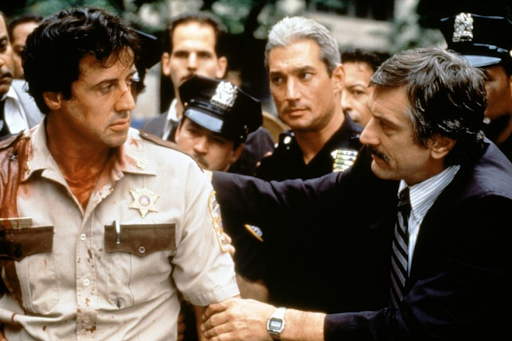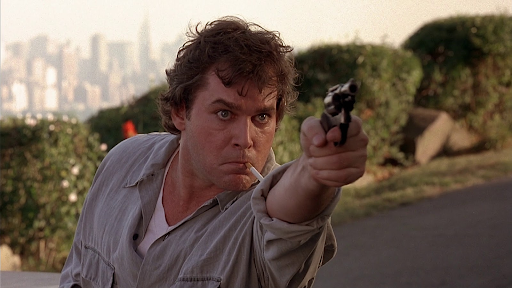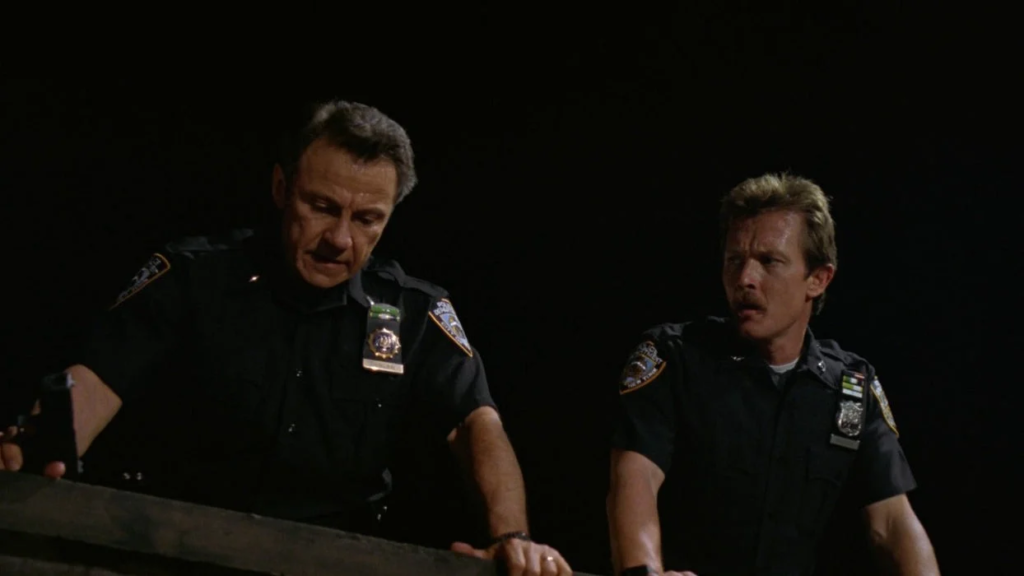|Chris Polley|

Cop Land plays at the Trylon Cinema from Sunday, March 17th, through Tuesday, March 19th. Visit trylon.org for tickets and more information.
There’s a certain built-in legacy in the alliterative phrase “corrupt cop” that belies its own linguistic paradox (or, perhaps, even its redundancy). The rogue detective, the rule-breaking sheriff, and the trigger-happy officer: even before modern American history blew the door wide open on mass media’s complicity in the “Copaganda” machine, this archetype was a cornerstone of vanguard cinema. Arguably the most pivotal film in this dramatic subgenre was Sidney Lumet’s Serpico in 1973 starring Al Pacino, a true-ish story of the eponymous NYPD whistleblower who exposed systemic racketeering in the Big Apple a decade prior. Frank Serpico was still, however, “the one honest guy in a roomful of men with guns,”1 suggesting that even large-scale corruption can be beaten by a good guy with a gun. This trend continued in the 1980s with admirable, even iconic films like Peter Weir’s Witness and Brian De Palma’s The Untouchables, and into the early 90s after the beating of Rodney King with the outre, gonzo Bad Lieutenant by Abel Ferrera and the minor hit Unlawful Entry by Jonathan Kaplan.
It’s possible, though, that no film is more emblematic of today’s view of law enforcement than Spike Lee’s 1989 masterpiece Do the Right Thing, which deigned to not center the police but rather give the microphone to a community terrorized by them, yes, and who largely managed to not dignify their presence until the cold-blooded murder of a civilian happened in front of them. It was also inspired by a real life incident in Howard Beach, New York, that happened three years prior and also became quite prescient,2 seeing as how the beating of Rodney King by LAPD occurred less than two years later. But as a suburban white kid in 1997, I only knew Spike Lee as the guy from the Air Jordan commercials and Do the Right Thing as the poster in Martin Lawrence’s sitcom living room. Instead, I was watching the movies that centered the dirty cops and the lone wolves dedicated to stopping them in the flicks mentioned in the opening paragraph, whether on VHS, daytime TBS, or when my mom didn’t know any better, in the theater with my brother who was 16 years older than me and passed for my dad to the ticket takers.

One such film that hit me hard as a young teen in the cinema was James Mangold’s Cop Land, a film I partially agreed to see with my brother despite its silly title solely because of an Entertainment Weekly issue that touted its stacked, familiar cast: Ray Liotta from Unlawful Entry! Robert De Niro from The Untouchables! Harvey Keitel from Bad Lieutenant! Sylvester Stallone from Daylight (I only gave Rocky and First Blood a much-belated chance just last year) and Robert Patrick from Terminator 2 too? Sure, why not! While much of the film’s politicking and East Coast context definitely sailed right over my head, it still landed like a punch in the gut. Couple that with also venturing to the cineplex with my brother a mere month later or so to see Curtis Hanson’s hard-boiled L.A. Confidential, not to mention a 9th grade Western Civ teacher that loved to repeat the Lord Acton quote “absolute power corrupts absolutely” ad nauseam,3 I distinctly remember this particular autumn season being a turning point in my understanding of man’s darker nature—and more specifically, its inherent presence in American law enforcement.
What makes Mangold’s ensemble potboiler still so powerful today, and what made it stick with me like gum under a boot back then, is that unlike all its predecessors, and also unlike Hanson’s Oscar-winning period piece of the same year, its willingness to strike an honest balance between redemption for its small town sheriff protagonist Freddy Heflin (Sly in his infamous 40-pounds-heavier play to be taken seriously by the industry again) and brutal, unflinching portrayal of a system of rot and unmitigated toxicity. Taking place in Garrison, New Jersey on the other side of the George Washington Bridge, where NYPD cops exploit a loophole that allows them to work on the force but live in a crime-ridden haven of their own creation away from pesky Internal Affairs investigators like the motivated but half-resigned Moe Tilden (De Niro in a rare role of a stacked filmography that allows him to both play reserved and explosive), Mangold managed as a young director to convince the historically police-friendly monster Harvey Weinstein to keep the basics of this eerily realistic premise in place simply by acquiescing to a Miramax request to insert a voiceover describing the characters as “auxiliary traffic cops” rather than traditional NYPD beat cops.4 It’s a small concession considering that the film also opens with a cold-blooded murder of unarmed Black men by a drunken younger cop hilariously nicknamed Superboy (played with annoyingly pitch-perfect obliviousness by Michael Rappaport) that is then hastily and stupidly covered up by his uncle and fellow officer Ray Donlan (Keitel as a shell of a man).

A case can pretty easily be made that what follows is equal parts Western-esque, pitch black comedy (shout out to De Niro’s messy turkey on rye), and classic convoluted noir. With a script also by Mangold and a bombastic Howard Shore score (pre-Lord of the Rings but post-Silence of the Lambs), the tone is nuanced if a bit all over the place. But this scattershot vibe never once takes away from the film’s innate watchability, as so much of it is just watching bad guys pretending to be good guys and yelling at each other about it in every other scene. Stallone works his puppy dog eyes like it’s a full-time gig, Liotta is in full black helicopter mode in the best way possible, and unheralded character actors like Noah Emmerich, Paul Calderón, and Method Man (!!) pop up every few minutes to add distinct flavor to this grim world of half-considered payback plans, blundered back stabbings, and world-weary wordsmithing. Pair all this with a setting that is “all broken dreams, broken promises and broken spirits painted in neon bar lights and back alley shadows,”5 and you have an A-list takedown of Americana that nevertheless looks for comfort in much of that same iconography.
While Sheriff Freddy is, indeed, the empathetic soul of the film, he is nevertheless pathetic throughout much of Cop Land’s runtime. This is what differentiates Mangold’s effort from the tireless gumption of Guy Pearce’s Edmund Exley in L.A. Confidential, or the eventually vindicated outsider John Book as played by Harrison Ford in Witness. Stallone’s oaf figurehead is “smart enough to recognize his position as a marriage of convenience” in a society that rewards those that look the other way more than those that speak into a microphone.6 Yes, the end of his ultimate arc and the script’s maybe-too-pat third act suggests that, like so many of its fictional sources of inspiration, there is still a path forward toward the light no matter your age or other such past failures and current limitations, and that justice is attainable despite these roadblocks. But apart from a tacked-on final shot and the return of the studio-mandated voiceover explainer, Cop Land remains a stand out in a crowded field of rogue detective movies if for no other reason than it doesn’t play nice about the roots that remain embedded in America’s slave patrol by another name7—even the voice of reason often arrives too late and already tainted.
- Scott Tobias, “‘Serpico’ at 50: a daring look at police corruption anchored by Al Pacino,” The Guardian. December 5, 2023. ↩︎
- Abbey Lustgarten, “Ten Details That Shaped Do the Right Thing,” Brooklyn Museum. October 12, 2023 ↩︎
- Sydney E. Ahistrom, “Lord Acton’s Famous Remark,” The New York Times. March 13, 1974. ↩︎
- Bilge Ebiri, “Behind the Fantasy of the 1997 Movie Cop Land,” Vulture. August 10, 2020. ↩︎
- Zach Vasquez, “High Noon in Bedford Falls: ‘Cop Land’ at 25,” CrimeReads. August 5, 2022. ↩︎
- Matthew Monagle, “‘Cop Land’ Is What Happens When A Few Bad Apples Spoil The Bunch,” The Playlist. June 18, 2020. ↩︎
- Jill Lepore, “The Invention of the Police,” The New Yorker. July 13, 2020. ↩︎
Edited by Finn Odum
